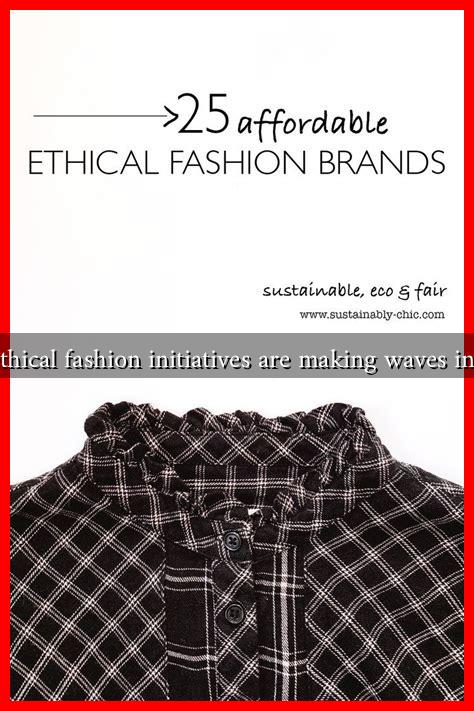-
Table of Contents
What Ethical Fashion Initiatives Are Making Waves in 2023?
As the fashion industry continues to grapple with its environmental and social impact, 2023 has seen a surge in ethical fashion initiatives that aim to create a more sustainable and equitable future. From innovative materials to transparent supply chains, these initiatives are not only changing the way we think about fashion but also how we consume it. This article explores some of the most compelling ethical fashion initiatives making waves this year.
1. Sustainable Materials Revolution
One of the most significant shifts in the fashion industry is the move towards sustainable materials. Brands are increasingly adopting eco-friendly fabrics that reduce environmental impact. Some notable examples include:
- Recycled Polyester: Brands like Patagonia and Adidas are leading the charge by using recycled plastic bottles to create high-performance clothing.
- Organic Cotton: Companies such as Eileen Fisher and Levi’s are committing to using organic cotton, which is grown without harmful pesticides and fertilizers.
- Innovative Fabrics: Startups like Bolt Threads are developing lab-grown materials, such as mycelium leather, which offer a sustainable alternative to traditional leather.
According to a report by the Global Fashion Agenda, the use of sustainable materials could reduce the fashion industry’s greenhouse gas emissions by 30% by 2030. This statistic underscores the importance of material innovation in the quest for sustainability.
2. Circular Fashion Initiatives
Circular fashion is gaining traction as brands and consumers alike recognize the importance of reducing waste. This model emphasizes the reuse, recycling, and upcycling of garments. Key initiatives include:
- Rental Services: Platforms like Rent the Runway and HURR Collective allow consumers to rent high-quality clothing, reducing the need for fast fashion purchases.
- Take-Back Programs: Brands such as H&M and Nike have implemented take-back schemes where customers can return old clothes for recycling or repurposing.
- Upcycling Projects: Designers like Christopher Raeburn are creating collections from surplus materials, showcasing the potential of upcycling in high fashion.
The Ellen MacArthur Foundation reports that transitioning to a circular economy could save the fashion industry $560 billion annually by 2030, highlighting the economic benefits of this approach.
3. Transparency and Fair Labor Practices
In 2023, consumers are increasingly demanding transparency in the fashion supply chain. Brands are responding by adopting fair labor practices and providing detailed information about their sourcing. Noteworthy examples include:
- Supply Chain Transparency: Companies like Everlane and Allbirds are committed to disclosing their supply chain practices, allowing consumers to make informed choices.
- Fair Trade Certification: Brands such as People Tree and TenTree are certified by Fair Trade organizations, ensuring that workers receive fair wages and safe working conditions.
- Blockchain Technology: Some brands are exploring blockchain to track the journey of their products, providing consumers with verifiable information about sourcing and labor practices.
A survey by McKinsey & Company found that 66% of consumers are willing to pay more for sustainable brands, indicating a growing market for ethically produced fashion.
4. Community Engagement and Social Impact
Ethical fashion is not just about sustainability; it also encompasses social responsibility. Many brands are engaging with communities and supporting social causes. Examples include:
- Local Artisans: Brands like Nisolo and Soko work directly with artisans in developing countries, providing fair wages and promoting traditional craftsmanship.
- Charitable Collaborations: Fashion brands are partnering with non-profits to support various social causes, such as mental health awareness and women’s empowerment.
- Education and Training Programs: Initiatives like Fashion for Good are investing in training programs for marginalized communities, helping them gain skills in the fashion industry.
These efforts not only uplift communities but also create a more inclusive fashion landscape.
Conclusion
As we navigate through 2023, ethical fashion initiatives are reshaping the industry in profound ways. From sustainable materials and circular fashion to transparency and community engagement, these movements are not just trends; they represent a fundamental shift in how we approach fashion. With consumers increasingly prioritizing ethical practices, brands that embrace these initiatives are not only contributing to a better world but also positioning themselves for long-term success. The future of fashion is ethical, and it is up to all of us to support these transformative changes.
For more information on ethical fashion initiatives, visit Fashion for Good.

